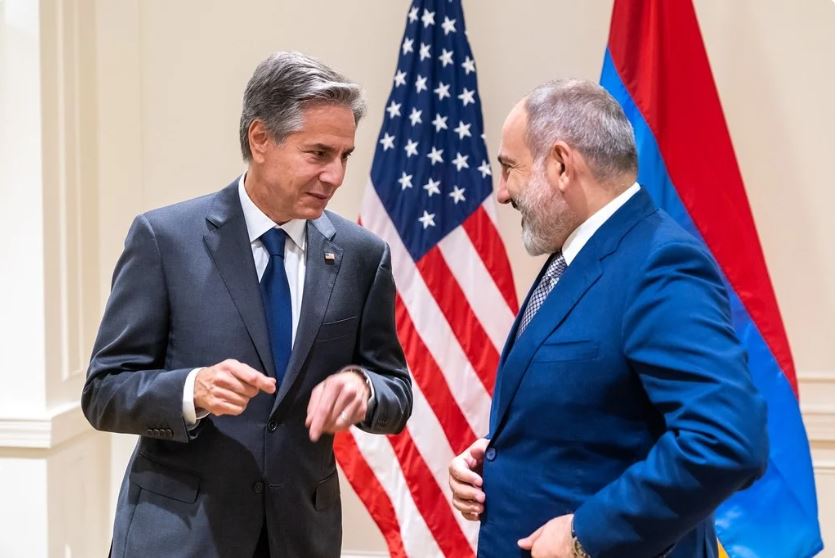by Michael Rubin
Talks continue quietly between US National Security Advisor Jake Sullivan and his Armenian counterpart Armen Grigoryan as the Biden administration seeks to conclude within months, if not weeks, a peace treaty between Armenia and Azerbaijan.
Sullivan and Secretary of State Antony Blinken’s motives are not altruistic. Both entered office with grand diplomatic ambitions: reconciliation with Iran, peace in Afghanistan, and an end to entanglements in the Middle East. Today, the Middle East is in flames and the Afghanistan remains a stain on America’s reputation. In addition, the White House managed twice to be on the wrong side of the Ukraine War: First, Sullivan sought to convince Volodyrmyr Zelensky to flee into exile. Zelensky refused but as Ukrainians defied the odds and intelligence assessments, the White House scrambled to prevent any Ukrainian action that might cause Putin to lose too much face.
Read also
The current rush for peace in the South Caucasus fits a pattern in which incumbents rush initiatives as elections approach in order to redefine personal legacies. It is not just President Joe Biden. As the public turned on the Afghanistan and Iraq wars, President George W. Bush rushed separate peace processes with North Korea and the Palestinians. Likewise, as Benghazi threatened to overshadow Secretary of State Hillary Clinton’s legacy, she suddenly revived and rushed a flawed Somalia political process that now threatens to drag the Horn of Africa into war.
Peace talks between Armenia and Azerbaijan are advanced. Rather than agree on specific borders, Sullivan has proposed both sides agree on how many square kilometers Armenia and Azerbaijan will be, an idea that theoretically bypasses disputes over maps and the difficulties of demarcating borders. Such a formula would also facilitate eventual land swaps, especially among the many enclaves that former Soviet Premier Joseph Stalin created.
Biden, Sullivan, and Blinken may want a quick deal, but there are three reasons why Armenia should not allow Washington to bully it to achieve one. First, too often, the State Department seeks to force concessions from democracies like Armenia, Cyprus, Israel, or Ukraine because it is easier than forcing dictators to bend. Second, to be an even broker, the State Department inadvertently encourages extremism as dictators make ridiculous claims believing American mediators will split the difference. Finally, too many American diplomats still believe parties enter negotiations sincerely, rather than as a means to delay and distract.
Armenians are pro-peace, but peace must bring security. Armenian negotiators should demand the United States recognize both Armenia’s borders and its total size. Russian President Vladimir Putin explained his inaction in the face of Azerbaijani aggression in Nagorno-Karabakh with reference to the 1991 Almaty Declaration in which the newly-independent states recognized both the “territorial integrity of each other and inviolability of the existing borders.” Azerbaijan applauded. But if the Almaty Declaration is immutable, then Washington should not only demand the immediate withdrawal of all Azerbaijani forces from Armenian territory, but also recognize the Armenia-Azerbaijan frontier as laid out by the 1975 Soviet General Staff map. These should be prerequisites before negotiations begin rather than agenda items.
Both Armenia and the United States have ample reason to doubt Azerbaijani sincerity in negotiations. The backstory to Acting Assistant Secretary of State Yuri Kim’s September 14, 2023 declaration before the Senate Foreign Relations Committee that “We will not tolerate any attack on the people of Nagorno-Karabakh” just days before the Biden administration did just that was that she and Blinken believed Azerbaijani President Ilham Aliyev’s private assurances that he planned no military operations.
Given Aliyev’s frequent lies, it is imperative that the United States guarantee Armenia a qualitative military edge over Azerbaijan. There are two ways to achieve this. First, the United States can augment weaponry available to Armenia. Concerns about leakage to Russia have little merit given both that Russia has already captured much the same weaponry from Ukraine and such concerns do not prevent weapons sales to India. Rather, the Pentagon can do as France does and deploy personnel to supervise the status and handling of such weapons platforms. Second, the United States should use diplomatic pressure to end Israel and Turkey’s supply of high-end drones and weaponry to Azerbaijan. That Israel seeks an emergency supplemental from the U.S. Congress to help it defend itself from Hamas should only enhance American insistence that Israel keep Israeli weaponry inside Israel. Likewise, Turkey should receive no new aircraft so long as it arms Aliyev.
Finally, peace will be meaningless if Armenia’s economy is left to wither on the vine. The end of Turkey and Azerbaijan’s blockade must be hardwired into any peace agreement, with the United States and France — not Russia and Turkey — in charge of the customs systems and information sharing at the root of seamless travel from the Turkish-Armenian frontier to the Black Sea and onward.
Too often, the Armenian government acts passively as other powers impose disadvantageous terms upon it. That was the case after the November 2020 ceasefire Putin crafted as well as last September’s end to the Nagorno-Karabakh War. Armenia’s government should not allow Biden, Sullivan, or Blinken to act like Putin. Rather, democracies and allies should have each other’s backs. Peace is crucial to the region’s future, but it must be real, based on Armenia’s security and economic needs and not simply on Washington political calculations.
(Michael Rubin is a senior fellow at the American Enterprise Institute in Washington, D.C.)





















































